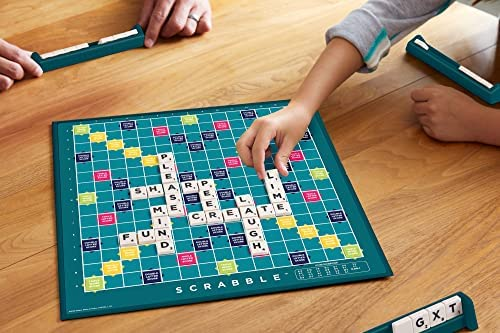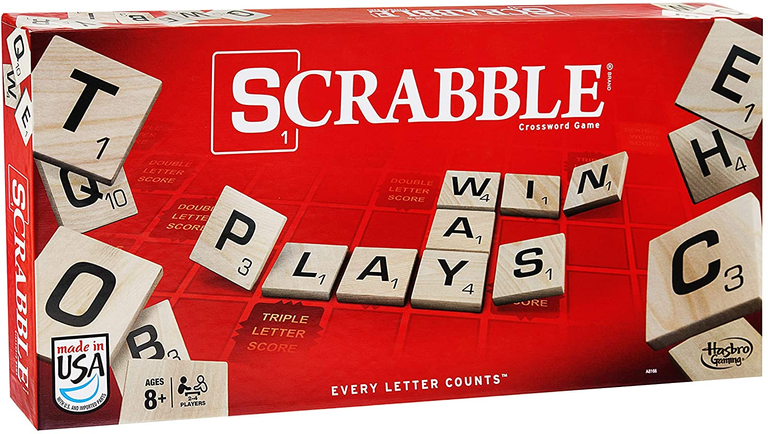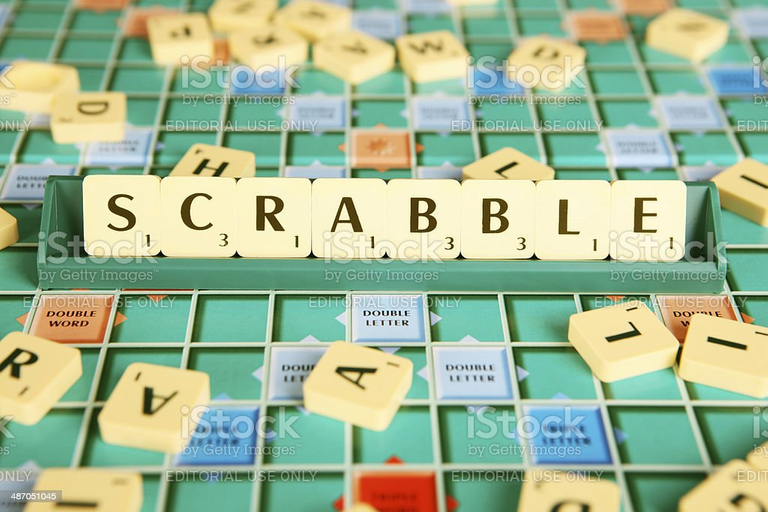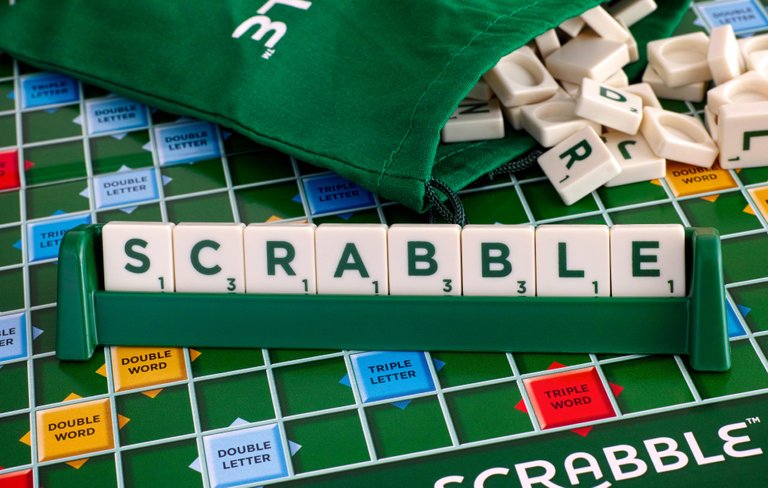Scrabble Tabletop Funny Word Game [ENG/DE]

Despite being a word-forming game, its history is counted in numbers, with 100 million copies sold worldwide. While it is sold in North America specifically between one and two million copies annually. One hundred and twenty thousand words can be formed in this game, which has evolved from being a submerged invention to becoming a global icon.
Potts studied and analyzed all the pre-existing games and it was found that they are divided into three categories: number games such as dice and bingo, action games such as chess, and word games such as anagram, which is a game of forming words but separately, each word separately without intersecting or intersecting with characters. Potts wanted to create a game that required skill but also luck in which players could score points. He combined elements of anagrams and crossword puzzles with the addition of new rules. At first it was called Lexico and later it was called Chris Crosswords. In order to determine the number and frequency of letters, Potts analyzed the words on the front pages of the New York Times.
The value of the pieces starts from zero for those without letters up to ten points for letters such as Q and Z.
The number of players in each round is from two to four. The game begins with each player drawing a piece, and the piece with a letter closer to the letter A starts playing. Each player draws seven letters and places them on the letter holder in front of him. In the center of the board there is a square with a star on it, from which the formation of the first word begins. This square gives a double value to the letter that is placed on it. But it's not the only square that doubles the value. On the scrapbook board, there are light blue boxes that give twice the value of the letter that is placed on them. The dark blue cells give twice the value of the letter. There are also bright red cells that give double the value of the entire word when a letter passes over it. And the dark red color that gives twice the value of the word.

When does a player lose his turn?
Once the game begins, players take turns forming words. Of course, when the player's turn comes, he draws new pieces until he completes the number of pieces in front of him to seven. He has the right to exchange some pieces for others, but then he will not be able to play and lose his turn. In the event that one of the players suspects that the word his opponent came up with does not exist or is not approved in the game, the so-called challenge is initiated. And then resort to the dictionary or the game manual to make sure. If he is right and the word is not supported, his opponent loses his turn.
In our game, words with prefixes or suffixes (additions) are not accepted. Do not accept words that require commas or a connecting line. Do not accept any word that requires a capital letter in its beginning.
When does the game end?
The Scrabble round ends when players have no more pieces left or they are unable to form new words. The player who scores more points is the winner.

Deutsch
Obwohl es sich um ein wortbildendes Spiel handelt, ist seine Geschichte in Zahlen gezählt, mit weltweit 100 Millionen verkauften Exemplaren. Während es speziell in Nordamerika zwischen einer und zwei Millionen Exemplare jährlich verkauft wird. Einhundertzwanzigtausend Wörter können in diesem Spiel gebildet werden, das sich von einer untergetauchten Erfindung zu einer globalen Ikone entwickelt hat.
Potts untersuchte und analysierte alle bereits existierenden Spiele und stellte fest, dass sie in drei Kategorien unterteilt sind: Zahlenspiele wie Würfel und Bingo, Actionspiele wie Schach und Wortspiele wie Anagramm, bei dem es sich um ein Wortbildungsspiel handelt aber separat, jedes Wort separat, ohne sich mit Zeichen zu schneiden oder zu schneiden. Potts wollte ein Spiel schaffen, das Geschick, aber auch Glück erfordert und bei dem die Spieler Punkte sammeln können. Er kombinierte Elemente von Anagrammen und Kreuzworträtseln mit dem Hinzufügen neuer Regeln. Zuerst hieß es Lexico und später Chris Crosswords. Um die Anzahl und Häufigkeit der Buchstaben zu bestimmen, analysierte Potts die Wörter auf den Titelseiten der New York Times.
Der Wert der Stücke beginnt bei Null für diejenigen ohne Buchstaben bis zu zehn Punkten für Buchstaben wie Q und Z
Die Anzahl der Spieler in jeder Runde beträgt zwei bis vier. Das Spiel beginnt damit, dass jeder Spieler ein Stück zieht, und das Stück mit einem Buchstaben, der näher am Buchstaben A liegt, beginnt zu spielen. Jeder Spieler zieht sieben Buchstaben und legt sie auf den Buchstabenhalter vor sich. In der Mitte des Bretts befindet sich ein Quadrat mit einem Stern darauf, von dem aus die Bildung des ersten Wortes beginnt. Dieses Quadrat gibt dem darauf platzierten Buchstaben einen doppelten Wert. Aber es ist nicht das einzige Quadrat, das den Wert verdoppelt. Auf dem Scrapbook-Board gibt es hellblaue Kästchen, die den doppelten Wert des darauf platzierten Buchstabens ergeben. Die dunkelblauen Zellen ergeben den doppelten Wert des Buchstabens. Es gibt auch leuchtend rote Zellen, die den doppelten Wert des gesamten Wortes ergeben, wenn ein Buchstabe darüber geht. Und die dunkelrote Farbe, die dem Wort den doppelten Wert verleiht.
Wann verliert ein Spieler seinen Zug?
Sobald das Spiel beginnt, bilden die Spieler abwechselnd Wörter. Wenn der Spieler an der Reihe ist, zieht er natürlich neue Steine, bis er die Anzahl der Steine vor sich auf sieben vervollständigt hat. Er hat das Recht, einige Steine gegen andere auszutauschen, aber dann kann er nicht spielen und verliert seinen Zug. Für den Fall, dass einer der Spieler vermutet, dass das Wort seines Gegners nicht existiert oder im Spiel nicht zugelassen ist, wird die sogenannte Challenge eingeleitet. Und dann greifen Sie zur Sicherheit auf das Wörterbuch oder die Spielanleitung zurück. Wenn er Recht hat und das Wort nicht unterstützt wird, verliert sein Gegner seinen Zug.
In unserem Spiel werden Wörter mit Präfixen oder Suffixen (Zusätzen) nicht akzeptiert. Akzeptieren Sie keine Wörter, die Kommas oder eine Verbindungslinie erfordern. Akzeptieren Sie kein Wort, das am Anfang einen Großbuchstaben erfordert.
Wann endet das Spiel?
Die Scrabble-Runde endet, wenn die Spieler keine Steine mehr haben oder keine neuen Wörter bilden können. Der Spieler, der mehr Punkte erzielt, ist der Gewinner.


This is a one-time notice from SCHOOL OF MINNOWS, a free value added service on hive.
Getting started on hive can be super hard on these social platforms 😪 but luckily there is some communities that help support the little guy 😊, you might like school of minnows, we join forces with lots of other small accounts to help each other grow!
Finally a good curation trail that helps its users achieve rapid growth, its fun on a bun! check it out. https://plu.sh/somland/
Congratulations @mr-kratos! You have completed the following achievement on the Hive blockchain and have been rewarded with new badge(s):
Your next target is to reach 300 upvotes.
You can view your badges on your board and compare yourself to others in the Ranking
If you no longer want to receive notifications, reply to this comment with the word
STOPSupport the HiveBuzz project. Vote for our proposal!